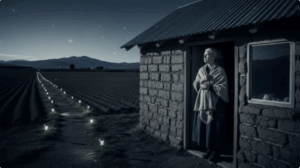The Storm That Brought More Than Rain
In the quiet, forgotten village of São Miguel dos Serros, the rain poured down in violent sheets. Old rooftops groaned, and muddy paths turned into rivers. Esperanza Hernandes, an elderly woman living alone, braced against the storm inside her humble adobe cabin. It was a place untouched by time, where most of the young had long left, and those who stayed did so out of necessity. On that night, as thunder echoed through the mountains, she shut her windows tightly, muttering curses at the cold that made her bones ache worse than ever. She wasn’t expecting company—not at midnight, not in that storm. But then, a knock.

A Stranger at Her Door
She hesitated. Who would be out there at this hour? Through the shutters, she spotted a man—tall, soaked to the bone, with torn clothes and shoes so worn you could see his feet. He looked tired, like he’d walked for days. “Please, ma’am, just for one night,” he said. Esperanza had seen many passersby: migrants, lost tourists, even drug traffickers. But something about this man softened her. She opened the door, remembering her mother’s voice: “Never turn away someone in need.” The man, who called himself Aurélio, stepped in and left puddles on her floor.
Warmth, Tea, and an Unlikely Bond
Aurélio was older than she thought, his hair white and his beard thick. But his eyes were sharp, deep, almost too knowing. She offered him a seat near the fire, a blanket, and a cup of tea made from her tiny kitchen. As they talked, he asked her about the village, the people, and the abandoned fields. She explained how the town had withered, how the young had gone north, and how dreams had dried up along with the land. “It’s just us old folks now,” she said with a sigh. “Waiting for something that never comes.”
A Question That Made Her Pause
Before dawn, Esperanza was already up to make breakfast. To her surprise, Aurélio was also awake, staring out the window like he was memorizing every leaf. He praised her cooking—not out of flattery, but with genuine appreciation. Over eggs, beans, and hand-pressed tortillas, they talked more. Then he asked: “Who owns the land here?” She mentioned the old families, especially Dom Facundo, who controlled the north but let it rot. Aurélio nodded slowly, thoughtful. “And if someone wanted to buy it?” She blinked at him. “Buy it? Why would anyone want dying land?” He smiled. “Sometimes, it just needs the right hands.”
Two Days Later, a Shocking Return
The village woke to chaos two mornings later. Black SUVs from Mexico City rolled in. Lawyers stepped out, holding briefcases and crisp suits. “We represent Mr. Aurélio Mendoza,” one said, “here to buy land.” The villagers gathered, stunned. Dom Facundo mocked the idea—until he emerged from a meeting pale and holding a check worth three times his land’s value. One by one, everyone sold—lands once worthless, now bought in cash. Families who had given up hope left the town hall with tears and disbelief. By dusk, nearly every field and house in São Miguel dos Serros belonged to one man.
The Secret Behind the Name
Esperanza watched from the plaza, her heart pounding. Could it be the same Aurélio? The man she gave tea and shelter just two nights earlier? When the lawyers said the land would be used for development to create jobs and restore the village, many cheered. But Esperanza stayed quiet. That night, sleep escaped her. Something in her gut said it was him. And sure enough, the next morning, there he was—sitting on a bench in the square, same hat, same ragged clothes, same warm smile. “Good morning, Señora Esperanza,” he greeted. “Or should I say, Señor Mendoza?” she replied.

A Confession Years in the Making
They sat together, and Aurélio told her everything. He was born in this very village, but left young chasing wealth in the city. He succeeded—became a man of business and fortune. But he also lost everything that mattered. Five years ago, when his company collapsed, he returned in secret. No one recognized him. No one helped him. He left bitter, swearing revenge. “But you,” he said, looking at her, “you reminded me that kindness still exists. That not everyone forgot how to care.” Her tea, her blanket, her words—they had restored something in him. Something money never could.
The Plan to Make It Bloom Again
“I’m going to bring this place back to life,” he said. “With jobs, roads, homes. A real future.” Within two weeks, work began. Trucks arrived. Engineers measured land. Young men were hired. Old houses were restored. Esperanza’s roof was repaired. Her small garden given tools. She was even named to the town’s new council—something she never imagined. Families started to return. Children played in the streets again. The sound of life slowly filled the air. The town that had once been forgotten was now remembered, because of one act of kindness during a stormy night.
The Legacy of a Stranger’s Gratitude
Aurélio never moved into a mansion. He stayed in the same humble clothes, often walking the village like any other neighbor. But now, he walked with purpose. The man who once vowed to destroy São Miguel dos Serros had become its savior. And all because one woman offered a blanket, some tea, and her time. Esperanza, too, changed. No longer alone, she became a symbol of hope in a town reborn. In the end, it wasn’t the money that saved São Miguel—it was a moment of compassion, given freely, with no expectations. And that was more powerful than gold.
News
Bilyon-Bilyong Budget, Bilyon-Bilyong Tanong: Matinding Sagutan ng Dalawang Senador sa Senado
Hindi pangkaraniwan ang tensyong bumalot sa plenaryo ng Senado nang muling talakayin ang panukalang pambansang badyet para sa 2026. Sa…
Sa Loob ng Karangyaan: Top 10 Pinaka-Magarang Bahay ng Mga Sikat na Vlogger sa Pilipinas
Sa nagdaang mga taon, tuluyang nabago ng social media ang anyo ng tagumpay sa Pilipinas. Mula sa simpleng pag-upload ng…
O pedido que silenciou a festa: Maria Alice e a lição de amor que Virgínia recebeu no Natal
No meio de uma festa de Natal cuidadosamente preparada, quando risos, luzes e músicas festivas criavam um clima de encantamento,…
O Pedido de Natal de Maria Alice que Silenciou a Festa e Tocou o Coração de Virgínia
Em meio ao brilho das luzes de Natal e à expectativa de uma celebração perfeita, um pedido inesperado de uma…
Crise no Casamento de Isis Valverde? Marcos Buaiz Reaproxima-se de Wanessa Camargo em História Repleta de Emoções
Nos bastidores do mundo das celebridades, algumas histórias conseguem surpreender até os mais atentos. É o caso do que começou…
Crise silenciosa, passado reacendido e escolhas difíceis: os bastidores da suposta turbulência entre Marcus Buaiz, Isis Valverde e Wanessa Camargo
No universo das celebridades, nem tudo o que parece sólido resiste ao peso do tempo, das rotinas intensas e das…
End of content
No more pages to load









